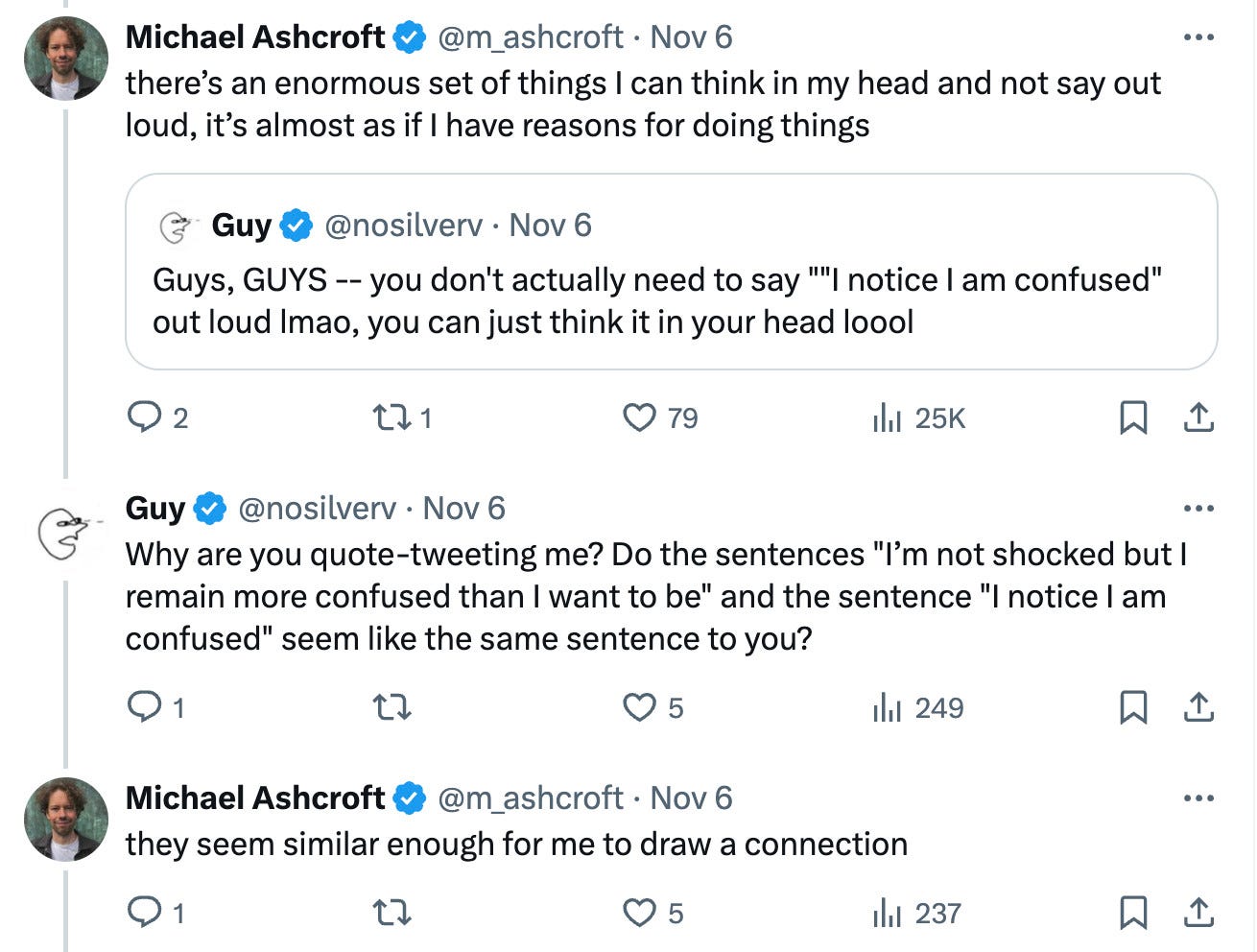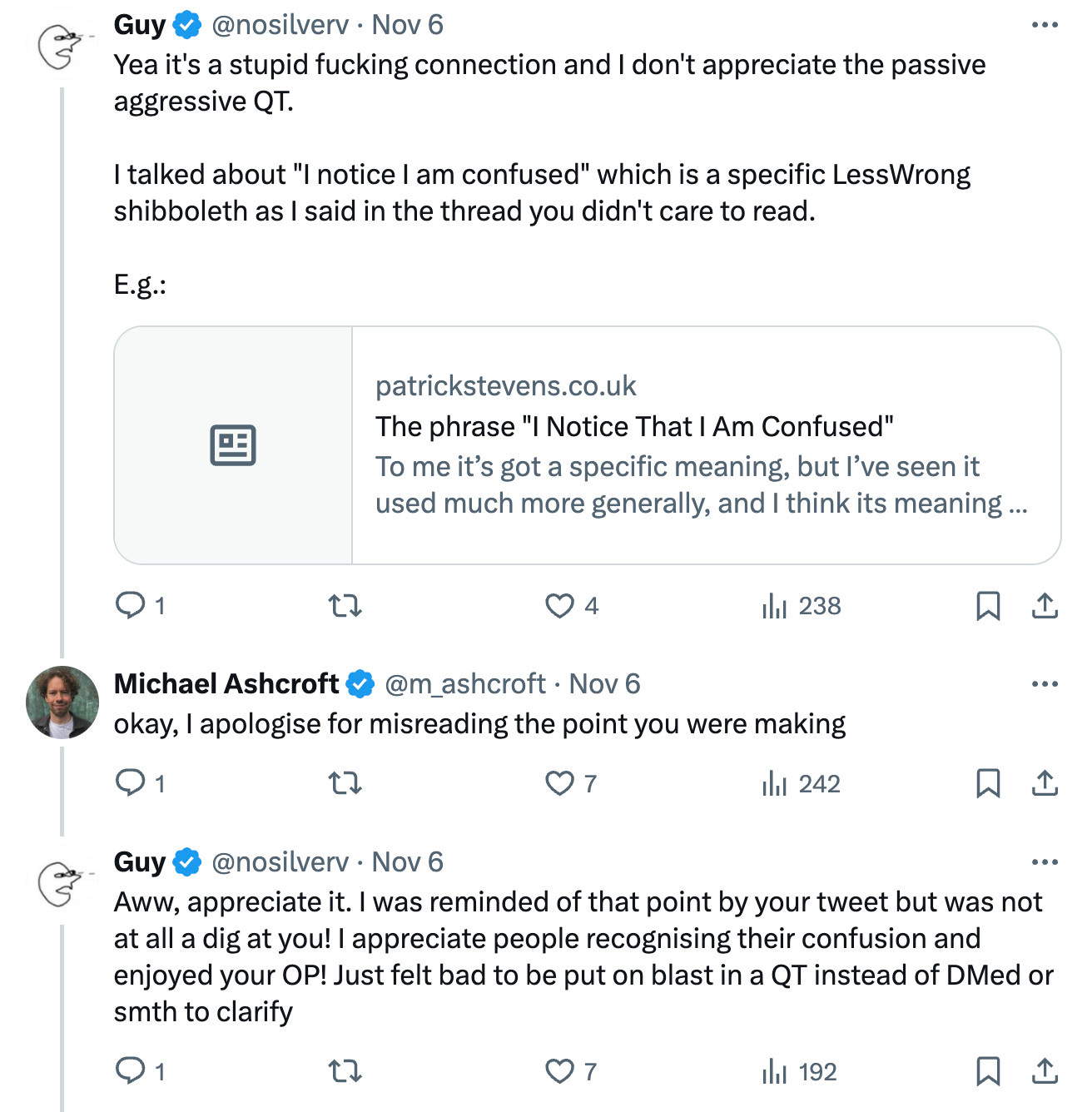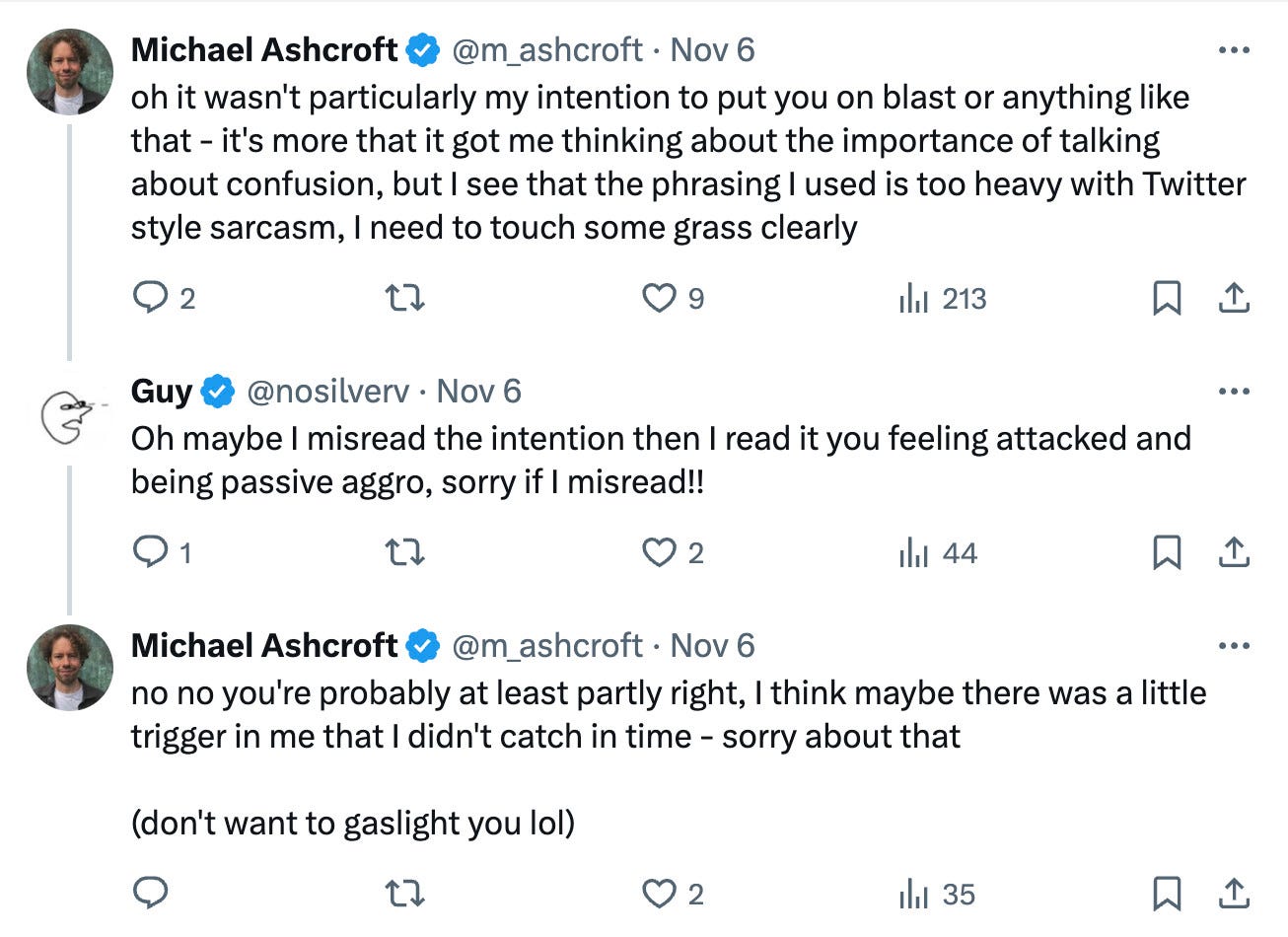Anatomy of an Internet Argument #4 - A Success Story
A real world example of recovering from a hostile interaction
The Anatomy of an Internet Argument series is about failure modes of communication & how to fix them. Today’s issue is a success story where an interaction starts out hostile, and ends very positively.
People don’t believe me when I say this happens all the time, but it does, and it would happen WAY more if people actually tried.
I’ll show you the full interaction, with a blessing from both parties involved, then walk you through my analysis.
Full interaction
The original thread starts with Michael reflecting on Trump’s win:
I’m not shocked but I remain more confused than I want to be
He quotes a tweet by Guy in his reflection, and that’s where their interaction starts:
Analysis
Guy read Michael’s initial quote of him as hostile, meanwhile Michael was confused as to why his innocent comment would trigger such an aggressive reaction.
They were literally having two different conversations. Here’s an illustration of what I believe they were each reading in each other’s words:
In Guy’s world, it makes perfect sense to ask: “why ARE you being so passive aggressive/snarky??”
In Michael’s world, Guy’s hostile reaction makes no sense
I see this pattern over & over, and usually the people end the interaction by insulting each other, (incorrectly) believing that the other guy is an idiot or not interested in good faith discussion. But Michael short circuits this:
okay, I apologize for misreading the point you were making
This is the inflection point that saves the interaction. This is a genuine apology that validates Guy’s perspective1. It allows Michael to signal “I am genuinely interested in understanding”. This type of move is rare only because no one expects the other side to be reasonable, so they don’t even give them a chance.
Guy is a reasonable person, interested in good faith discussion, so once his perspective is understood, his anger disappears, and he explains his own perspective, which makes everything click for Michael in retrospect.
I LOVE this last comment by Michael:
no no you're probably at least partly right, I think maybe there was a little trigger in me that I didn't catch in time - sorry about that
(don't want to gaslight you lol)
This tells me that Michael really did understand Guy’s perspective. I think Michael re-read his words with this new frame and:
could see how it was totally reasonable to interpret it as hostile
realized he did actually feel slighted by the comment about “not saying your confusion out loud”, and that unintentionally came out through his tone
Once Michael realized this, it was important for him to confirm that Guy’s interpretation wasn’t wrong (“don’t want to gaslight you”), because Michael is also a reasonable person interested in good faith discussion.
Takeaways
When communicating with another human being, it doesn’t matter what you intended, it matters what they heard. This is how all language works. The meaning of words in a dictionary doesn’t matter2, what people think the word means is what matters. The best we can do is say things & check their understanding, and repeat. This is how we communicate, online and offline.
This same pattern happened to me recently3:
Someone interpreted my words not in the way I intended
I explained my perspective
He apologized
But, same as Michael, I told him NOT to, because I don’t think his original read was wrong. If the person I’m communicating with has failed to understand, that’s as much my fault as his. If MOST people failed to understand it, then it’s definitely a failure on my part.
Me: "power corrupts" is a targeted memetic virus. It's designed to work on those with integrity, so they stop competing, leaving empty seats for those who show up to seize it
<he calls me out on it, I say that he’s right, I don’t mean it’s literally a conspiracy>
Him: Maybe I read too much into words like "targeted" and "designed". My bad!
Me: no don't apologize, that was my original thinking when I first wrote it! I didn't think too hard about it (but also some people may definitely read it this way, and I'm glad you're concisely explaining why that's not correct!!)
Assuming the other person is evil & stupid is self fulfilling, it brings out the worst in people. Assuming the best isn’t delusional — it’s giving the good & competent a fighting chance of connecting with you.
Thank you
and Michael Ashcroft for letting us openly study & learn from a personal moment like this.Thank you
for spotting this in the wild & sending it to me! I wouldn’t have seen this otherwise.One day I’ll set up a system where people can submit either their own interactions that they want feedback on, or others they stumble on, and we collectively give each other feedback & share what works. In the meantime, feel free to DM me/comment/email me etc. I have a group DM on twitter where we share interactions we’re struggling with. I find it very helpful to have a private space to diffuse the initial anger and get a second opinion on how best to respond.
it’s very important that Michael’s apology didn’t demand anything, like “my bad…but YOU were also being an asshole”. That wouldn’t have worked because it changes from a concession to a demand, leaving them locked in a fight stance.
I can confirm this speaking to a friend whose job is writing the dictionary: there is no holy source of definitions, they just look at how people use words and write that down.
Also this week, someone commented to share his story of encountering this same pattern, and how he resolved it with the phrase “I’m Confused”. He talks about how admitting he doesn’t understand the other person has cured him of this feeling that he’s always right & everyone else is an asshole. “It eliminates competition and encourages mutual understanding”, “I can’t remember a single time when deploying the phrase “I’m confused” made things worse”








I can't help but think about the deep connection between all these series of posts and Chuck Pezeshki's ideas, for whom "As we relate, so we think".
https://empathy.guru/fundamental-set-of-knowledge-structures/
I loved this one! It was a simple misunderstanding, but it escalated quickly! Resolved quickly, too!
The awareness that people moving through their normal thought processes will inevitably step on each other's toes and that's okay and even a good source of learning...it's nice. 😊